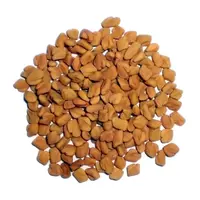Fenugreek seeds

Fenugreek (aka fenugrek, shambala, helba, methi, chaman) is one of those wonderful spices that give us not only a unique taste, but also invaluable benefits. Remotely resembling a mixture of legume and nut aromas, as well as having a bitter taste, fenugreek seeds have a peculiar aroma. In order to get rid of bitterness, it is recommended to soak this spice in water for several hours or fry.
It should be noted that the main application of fenugreek seeds in the field of cooking is due to the fact that it is an excellent natural thickener. It enjoys particular popularity in this role in eastern countries, in particular in India, where it is constantly added to sauces, gravy, soups and legume dishes. Firstly, it makes them much thicker, and secondly, it gives the dishes a special nutty taste and aroma. The calorie content of fenugreek seeds is 323 kcal per 100 grams.
Did you know that ground fenugreek seeds are part of many famous seasonings, such as: hop-suneli, curry, chutney, ajiku, masala and others. Often, cheeses and pastry are flavored with this spice. In the United States, it is often used to give a unique aroma to rum and maple drink, and in Egypt and Greece, a healthy salad is often prepared from sprouted seeds.
Benefits of fenugreek seeds
Even in the time of Hippocrates, the healing properties of fenugreek seeds were simply invaluable. In ancient Egypt, for example, they were used to facilitate childbirth. In Europe, fenugreek is still used for unpleasant painful menstruation. During travel, many tourists brew tea from this plant, using it as a remedy against stomach cramps, which can be caused by not entirely familiar food. The Chinese also use the plant to soothe stomach pains.
Traditional medicine for a reason claims the benefit of fenugreek seeds, since this plant has the ability to gently remove toxins from the body through the lymphatic system. Thanks to recent studies, it was found that fenugreek lowers cholesterol and blood sugar levels, having a stimulating effect on the heart muscle.
After analyzing the composition of fenugreek, modern scientists have come to the conclusion that the benefits of fenugreek seeds are beyond doubt, because this is a rich natural source of proteins and carbohydrates. This spice also contains magnesium, potassium, calcium, phosphorus, iron, vitamins A, V1, V2, C, PP, folic acid, and is also very similar in composition to fish oil.
Damage to fenugreek seeds
The harm of fenugreek seeds is obvious when eaten during pregnancy (it can cause bleeding or even trigger a miscarriage).
fenugreek seeds 323 kCal
The energy value of fenugreek seeds (Ratio of proteins, fats, carbohydrates - ju):
Proteins: 23 g (~ 92 kCal)
Fats: 6.41 g (~ 58 kCal)
Carbohydrates: 58.35 g (~ 233 kCal)
Energy ratio (bj | y): 28% | 18% | 72%
 Español
Español Français
Français Português
Português Русский
Русский 简体中文
简体中文 繁體中文
繁體中文 日本語
日本語 한국어
한국어 العربية
العربية Türkçe
Türkçe Қазақ
Қазақ Deutsch
Deutsch Italiano
Italiano Українська
Українська
